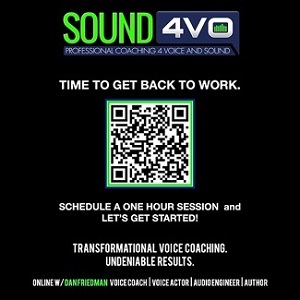|
INCOME - PART 2 Client Not Paying? Try These Nine Ways To Collect & Protect Yourself November 14, 2013 See Part 1: Manage Your Finances  By Paul Strikwerda Voice Actor In a perfect world, every client could be trusted and everyone would always pay on time. We all know that reality is not like that. So, what to do when a client keeps you waiting or does not pay you at all? Thereís no straight answer because I think it depends on your relationship with your client. Hereís what I do: 1. Depends on client. I am willing to cut returning clients who have a solid payment history a lot of slack. Theyíve been there for me. Iíve been there for them. Weíll work it out. New clients, on the other hand, still need to prove themselves before I give them any credit. Iím not going to trust someone just because he or she sounds nice on the phone. 2. Build safeguards. I tend to build in more safeguards with clients outside of my geographical area or jurisdiction. Itís much harder to recoup money from clients on the other end of the globe than from those in my back yard. The more money is at stake, the more guarantees Iíll need. 3. Business - not emotion. When a client owes me, I refuse to get emotional. I usually send a few polite and understanding reminders. Iíll send the first one a week after the invoice was due, and the other a week after that. Nine out of ten times I get an apology and a check. If thatís not the case, I get on the phone to find out whatís going on. 4. Work it out. The more flexible I am, the greater the chance that Iíll see my money. Flexible doesnít mean letting someone off the hook. It could mean offering a payment plan. By being willing to work with these clients, I can save the professional relationship and create some good will. I would hate to lose a good client over something as stupid as money. When things go downhill, it helps to have some leverage. A few weeks ago, a client who still owed me asked if I could record a second video in a series for a specific client. I told him Iíd be happy to do that once the outstanding invoice was paid. That same day the situation was resolved. 5. Certify it. If nothing seems to work, I will notify the client in an official, certified letter that I have no other option but to turn them over to collections. Most of the time that will do the trick for domestic clients. So far so good, but what to do when things get out of hand and the client isnít open to reason? At this time itís fair to say that your relationship is pretty much ruined. Itís time to put your foot down and apply some pressure. 6. Go to 'end client.' Sometimes it helps to contact the end-client. Let me give you an example. A few years ago, I voiced a video for a small Scandinavian production house. They were hired by a manufacturer of appliances to produce promos for the European market. Months went by and I had yet to be paid. My friendly reminders fell on deaf ears. Meanwhile, the videos with my voice were all over cyberspace. Not cool. I decided to write an email to the CEO of the appliance manufacturer explaining the situation. He apologized profusely, and promised to get in touch with the production company. Two days later I received my payment. Needless to say, the Scandinavian production house never contacted me for other work, and that was just fine with me. 7. Collect agency. Of course, you can hand your case over to a collection agency. If youíre in the U.S., companies like the Media Recovery Group Inc. and Cambridge Receivable Solutions LLC, specialize in debt collection for freelancers and small businesses. ZenCash offers a collection solution that connects to your current invoicing software (such as Quickbooks, FreshBooks and others) to automatically send out notices to your customers when they are late on a payment. This is not a free service, but you only pay for what you use. 8. Go to court. If the non-paying client is in your jurisdiction, you can take him or her to small claims court. Depending on where you file, your claim may not exceed between $3,000 and $10,000. Attorney, actor and voice talent Robert Sciglimpaglia Jr. - author of VoiceOver Legal (a book every voice over should own) - notes that you can put a clause in your contract saying that your client agrees to submit to the jurisdiction of the state court where you are located. Then, should you have to sue, you can sue them in your own court, without having to travel to them. You could also pursue a lawsuit out-of-state and include filing costs and travel expenses in your claim. One word of warning. Winning your case in small claims court does not mean that youíll see your money. The court rules but does not collect. Before you decide to go to court, figure out whether or not the amount owed is worth your time, energy and money collecting it. One colleague told me that anything under $1,000 isnít worth the trouble and aggravation. This brings me to your last option ... 9. Forget about it. You can decide not to collect the money; never work for those deadbeat clients again, and tell the world about how youíve been treated. Shame your non-paying clients publicly and warn your colleagues. Social media can be devastatingly powerful. The Freelancers Union has a client scorecard where businesses are rated by members. Bear in mind that this is a work in progress. Many companies have only been evaluated by one person. When more contributions come in, this could become a very useful tool. By the way, membership of the Freelancers Union is free. Personally, Iím not afraid to share my stories. When Newspapers for the Blind refused to pay me a few years ago, I wrote about it in my blog. Believe me, I learned a costly lesson. MORE THAN NUMBERS ... In closing, Iíd like to suggest that itís easy to talk and think about money in abstract terms. But money is more than a bunch of boring numbers in a bank account. By charging a decent rate, you tell the world that you firmly believe your service is valuable. By paying you, clients show that they value and respect your work. Those who use your work without paying for it are thieves and deserve to face the consequences. SO PROTECT YOURSELF The bottom line is that you are not powerless. You can protect yourself against crooks and criminals. In order to do that, you need to organize and guard your business to the best of your abilities. As a freelancer, you put a lot more hours into your business compared to people with a regular job. You also run a bigger risk. For that, you deserve to be well compensated. You owe it to yourself. ----------------- ABOUT PAUL Paul Strikwerda is a 25-year veteran of the voice over industry whose Nethervoice service features German and Dutch voice overs, translation and evaluation services. Born in Holland, he has worked for Dutch national and international radio, the BBC and American Public Radio. Although 90% of his work is in English, Strikwerda also records in Dutch, German and French. Clients include Novartis, Johnson & Johnson, and the Discovery Channel. He also publishes an informative and entertaining blog, Double Dutch. Email: paul@nethervoice.com Web: www.nethervoice.comDouble Dutch Blog: www.nethervoice.com/nethervoice |
|
|
Inspiring interviews help your VO career
Get your bi-weekly dose here ... all things VO!
With Sean Daeley and Paul Stefano - check it out!
On Michael Langsner's Voice-Over Roadmap Podcast
As of the NEW website launch, 03/22/2012










One concern I have, however, is how to shame the non-paying client in public without it reflecting poorly on you with other and potential clients, who might wonder if I would do the same to them when there is (from their perspective) a reasonable explanation for the "slow" payment. I don't know of an easy way to post only to fellow voice over talent on LinkedIn, for example, without clients seeing this.
Still, I have one client, MediaMoxi in Atlanta,GA, who has not paid me in over a year despite repeated invoices and calls. Another voice talent has told me that they were extremely slow in paying him, too. So beyond the mention I've given them here, I want to do whatever I can to warn other voice talent about working with them. Any thoughts?
But, just a couple comments. First, it took me a while to get it through my head that I didn't owe credit to anyone, international corporation or one man band. When I want credit with a vendor, they require a credit app that they then vet. So, I required the same thing. All first projects, regardless of who the client was, were either prepayment of the estimated total or 50/50 and product not released until payment received. I never had a problem with that policy and anyone who didn't want to comply was a red flag to me and I'd let someone else take the risk (and all too often, I made the correct choice). I even got government agencies to pay me on delivery - even though they told me they couldn't.
I did some research years ago when our accounts receivable were astronomical and we'd have to borrow money every month to make payroll and pay the bills. I looked at A/R financing, factoring and use of a credit line (as we were doing) and by the time 30 days had passed, it was effectively costing us 10% of the invoice to be in the finance business. So, I decided to do my own financing. I raised all our prices by 11% across the board. Our pricing was still competitive. I then offered all my clients a 10% discount for full prepayment. My partner and other skeptics said it would not work and we'd lose business. But, when I suggested that the 10% represented an APR of 120% to the client, within a month of implementing the plan we had 95% compliance and the 5% who didn't take the discount, well, that was just extra income to us for carrying them.
Unless I have a long term working relationship with a client, there really is no expectation that they are credit worthy. If they object to completing and submitting a credit app (one man band or Fortune 500 corp.) that is a red flag. The Fortune 500 would definitely require a credit app from me if I wanted credit from them. It's simply business - GOOD business. One group of people I never gave credit to was any religious organization and I was also very, very careful with most any other non-profit organization. CBN was one of my clients for a while and with very little research I discovered they were (as usual) in financial challenges. I knew by reading the trade journals that Ampex (dates this, doesn't it) Corp. had cut them off completely - no parts for their all Ampex video production studios, no tape supplies, etc. So, they came to me. After telling me they wanted unlimited ordering and 120 day terms I told them what I knew about them and, did they go somewhere else? Nope! We worked out terms that were dictated by me.
So, your points are absolutely correct. Going into collection or playing the court game is just going to cost a lot of money and doesn't guarantee you'll get paid, you simply have a judgment. It's been more than once that I've driven up to an errant client's offices/home with my van and simply said "Fill'er up!" I sometimes ended up with things I could use, but mostly I had stuff I could sell off and recover at least part of the large amount (usually high five or six figures) they owed me.
The best policy for a freelancer is to just not get into a situation of being owed. I think the best policy for small, especially freelance, businesses like ours is to neither a borrower or lender be - in other words, pay your bills immediately or cash upfront or on delivery and don't grant credit, simply expect prepayment or payment on delivery - we are not banks. My terms always say - "Payment Due on Receipt" (of product and invoice).
Again, great articles and info, I hope our colleagues apply your ideas. They WILL work and help save many businesses. Oh yeah, and with PayPal and Square Up, there's no reason not to get paid NOW!
Cheers,
Ed